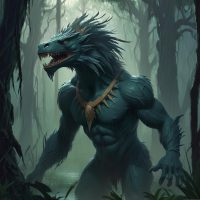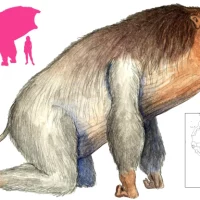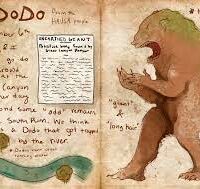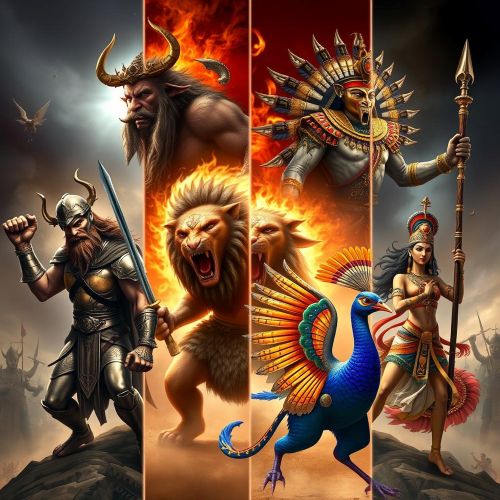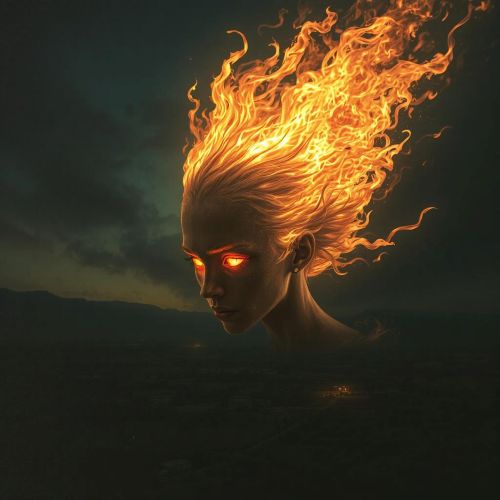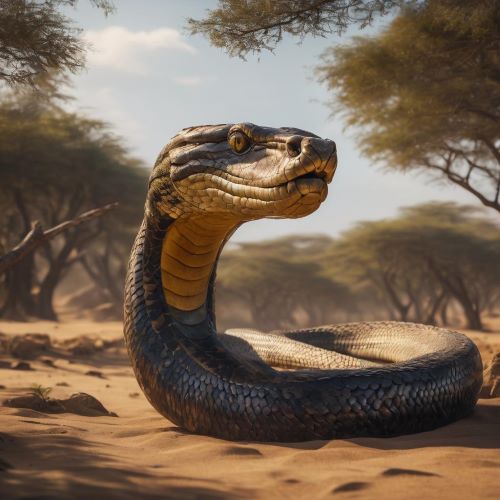Dodo : Lord of Beasts
Listen
At a glance
| Description | |
|---|---|
| Origin | Hausa Mythology |
| Classification | Animals |
| Family Members | Damina (Wife) |
| Region | Niger, Nigeria, Ghana |
| Associated With | Evil, Thunder |
Dodo
Introduction
In the intricate realm of Hausa mythology, the Dodo emerges as a prominent figure, renowned for its enigmatic nature and formidable presence. Originating from the Hausa ethnic group prevalent in West Africa, particularly in Nigeria, Niger, and parts of Ghana, the Dodo transcends mere legend to embody a symbol of spiritual significance and cultural identity. Unlike its avian namesake, the extinct flightless bird, the Hausa Dodo is a complex entity woven into the vibrant tapestry of sub-Saharan African folklore. Revered as both an evil spirit and an ancient deity, this creature evokes fear and is often associated with masculine power. Its role within Hausa mythology is multifaceted, inspiring fascination and reverence among the Hausa people.
Physical Traits
The physical appearance of the Dodo in Hausa mythology remains shrouded in ambiguity, with descriptions varying widely across different regions and tales. Some narratives depict the Dodo as a monstrous humanoid lurking within the depths of forests and swamps, while others hint at a connection to giant snakes, suggesting a serpentine form. This lack of definitive physical traits may serve a deliberate purpose, symbolizing the untamed wilderness and the unpredictable forces of nature that the Dodo embodies.
In Hausa folklore, the Dodo is often likened to a large, carnivorous lizard, believed to inhabit the depths of forests and emerge only under the cloak of darkness. Renowned for its immense strength and cunning intellect, the Dodo is depicted as a creature of towering stature, surpassing ordinary beings with its formidable presence. Its physique evokes images of a giant, with muscular limbs and a robust frame, while its appearance is further embellished by lustrous feathers in a kaleidoscope of vibrant hues, endowing it with an otherworldly beauty.
Family
In the realm of Hausa mythology, the Dodo is frequently portrayed as a solitary wanderer, traversing the earth in isolation. Nevertheless, alternate tales weave a narrative of the Dodo as a guardian spirit, overseeing the land and its inhabitants with a paternalistic gaze. The familial connections of the Dodo, if any, remain veiled in uncertainty, contributing to the air of mystique enshrouding this legendary entity.
Often linked with Damina, purported to be his spouse, the Dodo symbolizes the lush, verdant origins of the rainy season. Together, their union heralds the onset of rainfall, bringing fertility to the land. However, the lineage of the Dodo’s family remains obscured by mythic haze. While certain accounts portray the Dodo as a solitary figure, existing beyond conventional family structures, others depict him as forming unions with human partners, blurring the boundaries between mortal and divine realms.
Other names
While Dodo is predominantly recognized as the primary name for this deity in Hausa mythology, it also holds associations with the realm of thunder and lightning in certain contexts. Across diverse regions and linguistic variations, the Dodo assumes various appellations, each reflective of the nuanced cultural landscape of the Hausa people. Within some traditions, the deity is revered as “Dauda,” a title steeped in reverence and awe, while in others, it is honored as “Dan Dauda,” underscoring its stature as a mythic figure of profound significance.
The significance of the name “Dodo” itself extends beyond mere linguistic semantics, carrying diverse connotations depending on the cultural context. In certain areas, it conveys the notion of “gluttony,” aligning with the deity’s associations with excess and avarice. Alternatively, its etymology may trace back to terms linked with “spirits” or “ancestors,” suggesting a deeper connection to the mystical realms. The utilization of alternative names serves to underscore the multifaceted nature of the Dodo, offering insights into its diverse attributes and domains of influence.
In some instances, the deity is hailed as “Sarki da dazuzzuka,” signifying its sovereignty over the untamed wilderness and its inhabitants. Conversely, it may be invoked as “Kasagamaizo,” a designation intertwined with the realm of water spirits, hinting at its enigmatic ties to hidden dimensions beyond mortal comprehension.
Powers and Abilities
The Dodo is revered for its diverse array of powers and abilities, cementing its status as a formidable entity within the realm of myth. Among its attributed gifts is the power of foresight, enabling it to peer into the future with unparalleled clarity, assuming the role of a revered seer who imparts wisdom and guidance to those who seek it. Additionally, the Dodo is believed to possess the extraordinary ability of flight, soaring gracefully through the heavens with wings that span vast distances, transcending mortal limitations and venturing into realms beyond human comprehension.
In addition to these formidable attributes, the Dodo is associated with a myriad of other powers. As the progenitor of the cardinal directions, it occupies a spatial realm between east and south, symbolizing the dry season, desiccated vegetation, and the thunderous roar of storms. Moreover, the Dodo is reputed for its linguistic abilities, capable of conversing in human languages and forming unions with mortal spouses. Some accounts even speak of its capacity for shape-shifting, assuming the guise of various animals or humans to ensnare unsuspecting prey.
The Dodo’s dominion over the natural world extends to its control over weather phenomena, with storms and tempests viewed as manifestations of its potent influence. Intriguingly, its association with both the dry and rainy seasons underscores its complex role in regulating the natural cycles, embodying both destructive chaos and life-sustaining abundance.
The enigmatic nature of the Dodo’s powers mirrors the capricious essence of the wilderness it represents, embodying both the potential for destruction and renewal. It stands as a testament to the intricate interplay between myth and the natural world, captivating the imagination and inspiring awe in those who dare to explore its mysteries.
Modern Day Influence
While Hausa mythology may appear distant from contemporary realities, the enduring influence of the Dodo reverberates within modern society. Its symbolic resonance permeates various facets of Hausa culture, including literature, art, music, and folklore. Artists and storytellers draw inspiration from the Dodo’s mythical qualities, weaving captivating narratives that captivate global audiences. In recent years, there has been a resurgence of interest in Hausa mythology, driven by a growing appreciation for indigenous cultures and their cultural heritage. Consequently, the Dodo has emerged from the shadows of antiquity to assume a prominent role, serving as a symbol of cultural pride and identity for the Hausa people.
The concept of the Dodo continues to exert a profound influence on contemporary Hausa communities, where it is revered as a social mentor and guardian spirit. It features prominently in the pantheon of spirits within the Hausa system of possession trance. The absence of a definitive physical description allows modern artists to reimagine the Dodo in innovative and imaginative ways, ensuring its adaptability and longevity.
The Dodo’s complex and contradictory nature renders it a compelling figure for modern audiences. It embodies the raw power of nature, the capriciousness of life, and the intricate balance between human and natural forces. As such, the Dodo’s legacy persists, inspiring ongoing fascination and inviting fresh interpretations that resonate with the complexities of contemporary existence.
Related Images
Frequently Asked Questions
What is lorem Ipsum?
I am text block. Click edit button to change this text. Lorem ipsum dolor sit amet, consectetur adipiscing elit. Ut elit tellus, luctus nec ullamcorper mattis, pulvinar dapibus leo.
What is lorem Ipsum?
I am text block. Click edit button to change this text. Lorem ipsum dolor sit amet, consectetur adipiscing elit. Ut elit tellus, luctus nec ullamcorper mattis, pulvinar dapibus leo.
What is lorem Ipsum?
I am text block. Click edit button to change this text. Lorem ipsum dolor sit amet, consectetur adipiscing elit. Ut elit tellus, luctus nec ullamcorper mattis, pulvinar dapibus leo.
What is lorem Ipsum?
I am text block. Click edit button to change this text. Lorem ipsum dolor sit amet, consectetur adipiscing elit. Ut elit tellus, luctus nec ullamcorper mattis, pulvinar dapibus leo.
What is lorem Ipsum?
I am text block. Click edit button to change this text. Lorem ipsum dolor sit amet, consectetur adipiscing elit. Ut elit tellus, luctus nec ullamcorper mattis, pulvinar dapibus leo.

